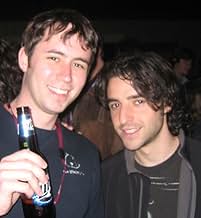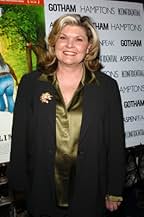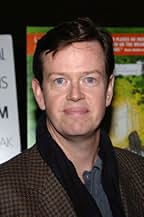अपनी भाषा में प्लॉट जोड़ेंAviva is thirteen, awkward and sensitive. Her mother Joyce is warm and loving, as is her father, Steve, a regular guy who does have a fierce temper from time to time. The film revolves aroun... सभी पढ़ेंAviva is thirteen, awkward and sensitive. Her mother Joyce is warm and loving, as is her father, Steve, a regular guy who does have a fierce temper from time to time. The film revolves around her family, friends and neighbors.Aviva is thirteen, awkward and sensitive. Her mother Joyce is warm and loving, as is her father, Steve, a regular guy who does have a fierce temper from time to time. The film revolves around her family, friends and neighbors.
- पुरस्कार
- 3 कुल नामांकन
फ़ीचर्ड समीक्षाएं
I think this is a great movie for people with daughters. If this movie doesn't make you want to be a better parent then I guess there is no hope after all. Well, I'm finally closing in on 200 words, I could have definitely stopped after saying "people had to laugh because if they didn't they would have to cry."
Very parallel to Alexander Payne's "Citizen Ruth" in covering some of the same territory about abortion, writer/director Todd Solontz mostly eschews that film's satire and easy jabs for a protean look at an issue that has a more complicated emotional landscape than advocates on either side usually concede.
He does this by literally taking us inside the mind of a young malleable adolescent who intentionally gets pregnant and is surprised at the reactions of those around her. Sometimes we see her as she sees herself, as if we are reading her diary, with her body-hating hopes for a change in hair, skin, age or family, and sometimes we see her as others see her.
Every one wants to control "Aviva" and their hypocritical selfishness is laid bare, regardless of their various good intentions. Her mother sees her still as a baby (a welcome back to the screen for Ellen Barkin who manages to add maternal warmth to hostile dialog) to the discomfiting sexualization (Britney-ization?) of just barely teens that is just barely a step above pedophilia, to how she is seen by pro-life advocates (whose Sunshine Band for "special children" seems almost as exploitative as JonBenet Ramsey's performances) and on in a picaresque dream scape that crosses a nightmare that is a bit extreme, especially for fans of "Welcome to the Dollhouse."
Solontz pulls this off by having every image of "Aviva" (according to the director's production notes) "portrayed by two women, four girls (13-14 years old), one 12-year-old boy, and one 6-year old girl" of widely variant size, shape, color and just about every other possible outward characteristic, even though one haranguer points out that no one can ever really change.
Solontz in a hand-out at the theater defined his use of the title as meaning "a condition of stasis and/or immutability; that part of one's personality or character that resists change, stays the same," but I'm not sure that successfully comes through in this provocative film, especially with some of the acerbic dialog and disturbing actions.
Nathan Larson's music is appropriately eerie, with spooky vocalizations by Nina Persson.
Releasing the film without a rating will probably keep it from being seen by young teens which is too bad as it is a frank and fresh look at the pressures on girls from friends, family and society.
I've seen a lot of strange films in my life, but this has to be right up there. Compared to this, "Happiness" was a crowd-pleasing knockabout comedy. I have to say that I found "Palindromes" hard going, even boring at times, although there was definitely a slow burn quality and by the end I was pretty much drawn in.
The film plays rather like a cross between Luis Bunuel and a live action "South Park". The multiple-actress technique pioneered in "That Obscure Object of Desire", deadpan style and flat picture quality on the one hand, taboo-breaking humour, song 'n' dance and perverse exploration of moral issues on the other.
I wonder what a conservative audience would make of this film. My guess is that it's aimed squarely at a liberal audience, but it absolutely refuses to pander to liberal prejudice, instead laying into the "pro-choice" position in a manner which can only be described as destruction testing. I get the feeling that Solondz is challenging his own opinions on the issue, as much as ours. Pro-lifers might see the storyline as vindicating their beliefs, but I dare say would be so horrified by other aspects of the film that they wouldn't make it to the end.
This is probably Solondz' bleakest movie to date, despite moments of (very dark) humour. Scientific rationalism is weighed against religious fundamentalism and both are found utterly wanting.
Incidentally there is no rape in this film, despite comments elsewhere, although there are certainly very disturbing scenes.
A brave movie, overall. I'm sure Solondz could take the David Lynch/John Waters route towards the (relative) mainstream with considerable success, but "Palindromes" sees him driving determinedly in the opposite direction, in every respect.
In terms of film-making, it is fairly innovative in technique, although audiences who have tired of director Todd Solondz's previous offerings (which include 'Storytelling' and 'Happiness') may say it is more of the same thing. A central new twist with Palindromes is that the central character a twelve/thirteen year old girl is played quite convincingly by a wide array of characters that are physically very different (black/white, obese/skinny, young/old, and in one incarnation even a young boy). They all have an eerie likeness and it is a credit to Solondz that, even without being warned of the device, audiences have barely a second's hesitation in linking up that it is the same person.
Aviva (her name is palindromic - spelt the same forwards or backwards) is 12 or 13 years old but has a very strong desire to have a baby. This is presented as quite a core issue with her, rather than a passing whim. Her mother reels between hysterical intolerance and forceful supportiveness, trying to be a 'good mother', feeling inadequate at the job, and making strident attempts to steer her wayward daughter. When Aviva first expresses her wish it's along the lines of wanting lots of babies so she will always have someone to love (she is a sweet and lovable, slightly chubby, black child and the wish is not taken to mean immediate action at this point). When she makes fumbling attempts to realise her aim with a boy about the same age she knows, we start feeling worried, even though the scene is trivialised and offered as humour. Solondz repeatedly tempts us to laugh at or with the characters during tragically gruesome scenes and then feel guilty about it. Aviva doesn't give up, even when we know her quest has become impossible.
One of the ways we test a proposition is to say, 'what are the exceptions'? Does it apply under all conditions? An Internet psychology test used rapid responses to demonstrate that, even people who think they are not racially prejudiced, still instinctively tend to view black people differently. We have innate prejudices about colour, gender, age, size/obesity that are not easy to overcome. Palindromes, by taking one character and showing her in many physical forms, makes us ask ourselves if we think differently about her situation when we give her a different physical form. If we feel sorry for her in one incarnation but less so (or more so) when her physical appearance is changed, what does that say about us? Similarly, if we make a judgement about a person, or about what is 'best' for a person, would it be the same if we could see into the future or different futures? The film's apparent premise (stated within the movie) is that we are always the same, we can't change, even though we grow older, may have a boob job or sex change, we are fated to be the same person we always come back to being who we are (a bit like a palindrome, that is spelt the same whether read left to right or right to left). 'How many times can I be born again?' screams a lapsed 'born-again' paedophile later in the movie. Is a person really fated to not be able to change? What might be truer would be to say that it takes a lot for people to change, to overcome natural hubris and unchanging habit if we are each individually a product of our genes, our environment and our inner will (or 'soul' for religious people), then real change has to be not just more than skin deep but deep enough to overcome external influences and predispositions. (When watching Palindromes, look out for the Wizard of Oz references!) But ultimately Solondz neither philosophises nor moralises he simply observes. That he observes such controversial, dilemma-ridden and offensive subject matter may provoke constructive thought in some (especially if you think he does it in a caring way) but derision in others. His pessimism is tempered by the fact that he gets away with it quips Solandz - "It says something good about mankind and people's discretion that when I walk in the street to pick up my groceries nobody has assaulted me."
क्या आपको पता है
- ट्रिवियाHeather Matarazzo turned down reprising the role of Dawn Wiener in this film.
- गूफ़Aviva is cradling a baby doll in her hands, then her mother comes in and they talk, and Aviva puts the doll down on the bed. During the conversation the doll's clothes change and the doll's position also changes a few times during the scene.
- भाव
Mark Wiener: People always end up the way they started out. No one ever changes. They think they do but they don't. If you're the depressed type now that's the way you'll always be. If you're the mindless happy type now, that's the way you'll be when you grow up. You might lose some weight, your face may clear up, get a body tan, breast enlargement, a sex change, it makes no difference. Essentially, from in front, from behind. Whether you're 13 or 50, you will always be the same.
'Mark' Aviva Victor: Are you the same?
Mark Wiener: Yeah.
'Mark' Aviva Victor: Are you glad you're the same?
Mark Wiener: It doesn't matter if I'm glad. There's no freewill. I mean, I have no choice but to chose what I choose, to do as I do, to live as I live. Ultimately, we're all just robots programmed abritrarily by nature's genetic code
'Mark' Aviva Victor: Isn't there any hope?
Mark Wiener: For what? We hope or despair because of the way we've been programmed. Genes and randomness, that's all there is and none of it matters.
'Mark' Aviva Victor: Does that mean you're never going get married and have children?
Mark Wiener: I have no anent desire to get married or have kids. But that's beyond my control. Really, it makes no difference. Since the planet's fast running out of natural resources and we won't make it into the next century.
'Mark' Aviva Victor: What if you're wrong? What if there is a God?
Mark Wiener: That makes me feel better.
- क्रेज़ी क्रेडिटIn loving memory of Dawn Wiener.
- साउंडट्रैकLullaby
(Aviva's and Henrietta's Theme)
Written by Nathan Larson
Performed by Nina Persson and Nathan Larson
टॉप पसंद
- How long is Palindromes?Alexa द्वारा संचालित
विवरण
- रिलीज़ की तारीख़
- कंट्री ऑफ़ ओरिजिन
- भाषाएं
- इस रूप में भी जाना जाता है
- Palíndromos
- फ़िल्माने की जगहें
- किंग्स्टन, न्यूयॉर्क, यूएसए(Restaurant & parking lot scene with Bob & Aviva. Superlodge 129 Route 28)
- उत्पादन कंपनी
- IMDbPro पर और कंपनी क्रेडिट देखें
बॉक्स ऑफ़िस
- US और कनाडा में सकल
- $5,53,368
- US और कनाडा में पहले सप्ताह में कुल कमाई
- $57,251
- 17 अप्रैल 2005
- दुनिया भर में सकल
- $8,09,686
- चलने की अवधि1 घंटा 40 मिनट
- रंग
- ध्वनि मिश्रण
- पक्ष अनुपात
- 1.85 : 1
इस पेज में योगदान दें



































